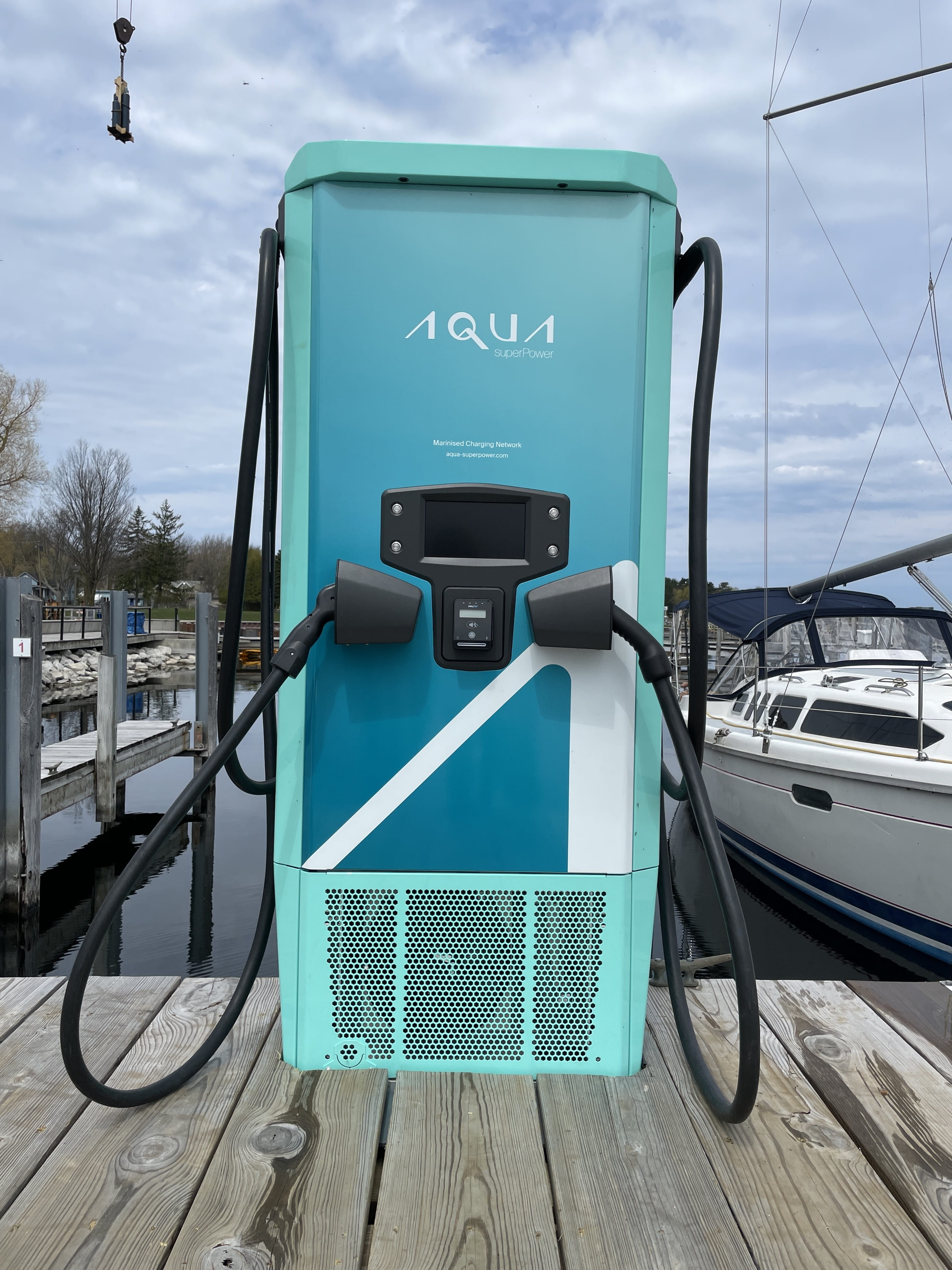The web Browser you are currently using is unsupported, and some features of this site may not work as intended. Please update to a modern browser such as Chrome, Firefox or Edge to experience all features Michigan.gov has to offer.
Challenge program builds on EV maritime innovation
July 27, 2023
A rising tide of innovation is lifting all efforts for a sustainable maritime future on the Great Lakes.
In April 2023, Gov. Gretchen Whitmer announced the Fresh Coast Maritime Challenge (FCMC), a dedicated grant program to help companies decarbonize and electrify Michigan marinas and watercraft, in line with the MI Future Mobility Plan and the MI Healthy Climate Plan for a healthy, prosperous, carbon-neutral Michigan for all residents by 2050. The first-in-the-U.S. challenge program put Michigan at the forefront of sustainable maritime transportation, including recreational boating, marina innovation, and Great Lakes commercial activity.

The Northport marina has installed a rapid charger for electric watercraft.
But even before the FCMC, innovators and state agencies were partnering in northern Michigan to establish the Fresh Coast Corridor: the first freshwater electric boat charging network in the U.S. They targeted a busy stretch of Great Lakes coastline – from Frankfort on Lake Michigan to Mackinac Island in Lake Huron – with a high concentration of marinas and harbors and primed to be an early adopter for e-boats. The FCMC will focus on the same corridor in its first phase of funding.
Aqua superPower rapid chargers are installed at G. Marsten Dame Marina in Northport and Elk Rapids Marina. A demonstration day is planned Aug. 24 at Elk Rapids Marina to showcase the charging equipment and electric boats from a few manufacturers. Through a grant from Michigan’s Office of Future Mobility and Electrification (OFME), AQUA superpower plans to install additional charging stations at Duncan Clinch Marina in Traverse City, Village of Charlevoix Marina, and Irish Boat Marina at Harbor Springs.
Water is a fast-growing frontier for vehicle electrification. MarketWatch expects the electric boat market to expand to $18 billion in 2027, up from $8.31 billion in 2021. That’s important with Michigan focused on reducing greenhouse gas emissions.
The Fresh Coast Corridor is about more than electric boats alone. It’s about decarbonizing both recreational and commercial marine activity through alternative propulsion: electric, hydrogen, hybrid, carbon capture, sustainable marine fuels, and more.
According to the National Marine Manufacturers Association, Michigan has more than 806,000 registered boats, and recreational boating brings in an estimated $7.4 billion a year to the state’s economy, supporting 31,000 jobs and 1,458 businesses. But only recently have efforts zeroed in on the dockside charging networks required to navigate the boating sector toward renewable energy.
Momentum is building across the recreation market for electric vehicles, boats, and more, yet our national infrastructure is not set up to support the growing consumer demand or business technological advancements. There are also challenges that new technologies bring that require public-private coordination and partnerships.
In the case of Michigan’s e-boat charging network, the partners supporting this effort include the Department of Natural Resources; the Michigan Economic Development Corporation (MEDC) and OFME; the Michigan Department of Environment, Great Lakes, and Energy (EGLE); the Michigan Department of Transportation (MDOT); and Traverse Connect, the lead economic development organization for the Grand Traverse region. OFME and its state government partners support clean maritime projects throughout the Great Lakes, not just in northwestern Michigan.
MEDC’s most recent strategic plan calls for developing auto manufacturing, e-mobility and electrification as strategic industries. It also highlights outdoor recreation as a statewide strength, championing the business development case where e-mobility and outdoor recreation meet. Traverse Connect is working closely with MEDC and others to attract new enterprises at the forefront of e-mobility tech, provide them with a test bed for new technologies, and help them network, navigate state infrastructure, and select locations.
The infrastructure created through the FCMC is expected to fuel continued growth and innovation in Michigan’s mobility industry, deliver considerable economic benefits, and create a blueprint for ports and harbors across North America.
“The Fresh Coast Maritime Challenge represents the intersection of mobility, outdoor recreation, and economic development and will create wide-reaching benefits across the entire state of Michigan,” Gov. Whitmer said in April. “This challenge will serve to modernize one of the most prevalent methods of mobility in Michigan while supporting sustainable marinas and commercial watercraft and protecting the beauty of our Great Lakes for generations to come.”
As part of the Fresh Coast Maritime Challenge, the OFME has partnered with Traverse Connect to identify grant recipients and facilitate the distribution of grant funds. Additional partners include EGLE, MDOT, DNR, and Michigan’s Office of Outdoor Recreation Industry.
Additional developments in maritime sustainability include the first-ever conversion of a Mackinac Island passenger ferry to zero-emissions electric power by the Mackinac Island Ferry Co., and state and federal funding to upgrade the Beaver Island Ferry to be more efficient, reliable, and environmentally friendly.
Adapted from an article in the 2022 Michigan State of the Great Lakes Report by Charlie Tyson of the Michigan Economic Development Corp. and Warren Call of Traverse Connect.